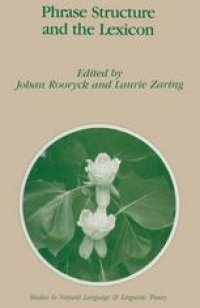
Ebook: Phrase Structure and the Lexicon
- Tags: Linguistics (general), Theoretical Languages, Computational Linguistics, Semantics
- Series: Studies in Natural Language and Linguistic Theory 33
- Year: 1996
- Publisher: Springer Netherlands
- Edition: 1
- Language: English
- pdf
V, ThemelPatients to the lowest specifier of V', and Agents to a position outside the minimal VP. Again, thematic information is encoded in terms of configurational properties. Addressing the issue of phrase structure in another domain, Margaret Speas investigates the status of null pronominal objects in Navajo. Following Rizzi (1986), she assumes that null pronouns must meet both a licensing and an identification condition. More specifically, she demonstrates that distributional restrictions on null pronominal objects in Navajo can be explained if it is assumed that null objects obey the identification condition expressed by the Generalized Control Rule of Huang (1984). Distinguishing three types of null objects, she argues that relevant licensing condition on two subtypes of null objects involves rich agreement. However, it appears that there are languages lacking rich agreement but with pro in object position. Speas accounts for these phenomena by a rule of economy of projection. A second series of papers is concerned with the way in which functional categories derive aspects of sentential interpretation. Three issues in this research program are investigated here: external arguments as arguments of functional projections (Kratzer), the specificity interpretation of clitics (Sportiche), and the interpretation of tense (Stowell). In all three cases, phrase structure is put to use to derive interpretive effects. Angelika Kratzer proposes that external arguments are not part of the verb.
The relation between phrase structure and the lexicon has always been an area of prime concern in syntactic theory, but never more so than in the recently developed minimalist framework, where the lexicon is largely reduced to configurational and computational properties of the grammar. Taking this perspective as their point of departure, the authors of this volume address issues including the mapping between thematic information and phrase structure, the way in which the configurational character of functional categories determines interpretation in a theory of phrase structure, and methodological discussions about core assumptions of phrase structure itself. Some of the essential themes that emerge are that projection and interpretation go hand in hand (a successful projection in an interpretable one), and that, to a large extent, phrase structure itself encodes lexical information and determines interpretation in the thematic domain.
Audience: Theoreticians in syntax, semantics and language acquisition, and in related fields.